Egypt - Confiscated land June 2015
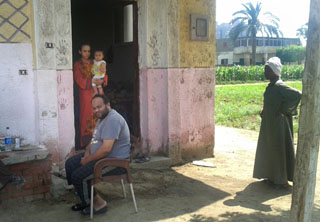
Villagers on the small island of Qorsaya got parts of their land confiscated by the army.
Crimes against human rights are worsening. There are serious flaws withing the judiciary, many trials are not in accordance to neither Egyptian law nor international standard, according to a newly released report from Human Rights Watch. That is something the inhabitants of the little island Qorsaya in the Nile river, almost in the middle of Cairo, can subscribe to. They are since fifteen years living under threats and harassments from the army, who - according to the villagers - wants their land on behalf of politicians and businessmen.
--------------------------------------------------------
The fishes flop lamely when they are taken up from the cage, submerged in the Nile water, and, with a quick twist thrown into a plastic bag. The fisherman gets some money from a young women in a black dress with a headscarf.
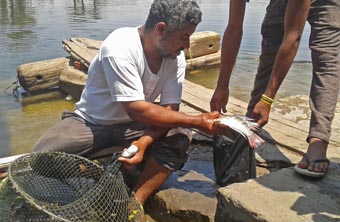
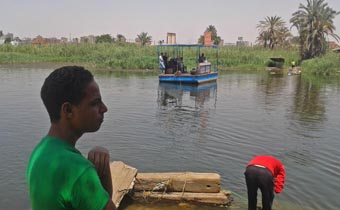
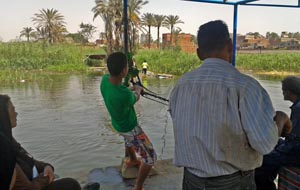
Selling fish, Qorsaya ferry
Here, at the Nile river, a few kilometers upstream from the very center of Cairo, life goes on as it did centuries ago. The ferry to the island of Qorsaya is pulled by hand by a young man. The chain rattles when it passes through the supporting wheels. The water in the Nile is higher than usual and we have to step on tree trunks and sacks filled with earth to be able to go ashore. Passing along a narrow path, the high houses of Cairo rise above the reef.
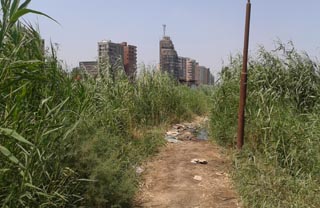
Attractive land, in the middle of Cairo
But since fifteen years there have been attempts from ministries and businessmen to evict the inhabitants of the island. The land of Qorsaya is hugely attractive for investors and the inhabitants have pursued a long juridical struggle, just to be able to continue living here. Those who want the land claim that the people on Qorsaya, mostly farmers, have not been living here long enough to have a right to stay.
-They are lying. Me, my father and my grandfather have lived here for more than ninety years, Mahmoud Abdul Moati, a man around his sixties, says. He sits on a mat, spread out on the ground under the shade of a tree. The sun is hot. Besides is a little stove with a tee kettle seething. Around us fields with cultivations. Me and my interpretor sits down on the mat. Mahmoud makes a gesture around.
-We have cows, we get milk. We catch fish and grow melons, tomatoes, pepper, corn. This is the way we live, he says.
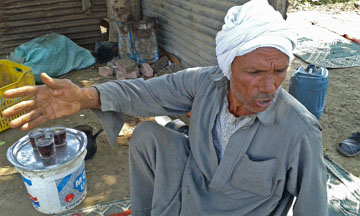
Mahmoud Boati, Qorsaya farmer. Imprisoned for one hundred days, without any charges.
What started as a juridical pursuit to evict the inhabitants, took a more sinister turn in 2007. One day Egyptian army troops came to the island, forced some farmers to leave their houses and confiscated their land. A succession of harassments and threaths followed during the years. The islanders continued the court processes and the different verdicts were in their favour, they had the right to live there and the confiscated land should be given back to them. But nothing happened. In November 2013 the army attacked again.
-In the early morning, around five, 300 troops came. They broke into our houses. We had our hands striped behing, they gave us electric shocks with teaser guns and we were beaten. Some managed to flee before but I had just undergone a kidney operation and couldn't run, Mahmoud says, pulls up his long skirt and shows us his operation scar.
-They brought twentyfive of us ashore and forced us up into trucks and took us to a prison. It was a civilian prison but we were put in the military department. Every fifteenth day, we were rearrested. They claimed we had been armed and had put up resistance but I didn't even have a knife in my house. They just took us when we were sleeping, Mahmoud tells and continues:
-In the prison I was in pains, I cried and needed to see a doctor for my kidney but was not allowed. After one hundred days, without any charges or prooofs, we were released but had our land confiscated.
Mahmoud pours sweet tea for us in small glasse. The army had a few years earlier from each family on the island, confiscated a few acres. This land the army used themselves to cultivate on. In some cases, the confiscated land was leased to other farmers, not from the island.
-In prison we were told that if we signed papers stating that we were not living on the island and had no claims to our land, we would be released, but I refused. What else can I make a living from than farming? I can die but I will never give up my land, Mahmoud says.
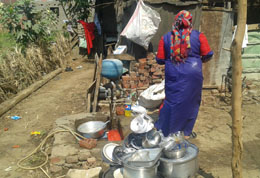
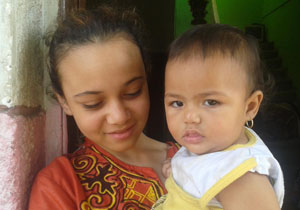
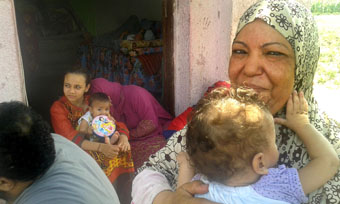
Primitive kitchen, Fatima, a baby girl and Umm Mohammad, Mohammad's mother, holding a baby.
Gees cackle and in the courtyard, Doaa washes the pots at the primitive outdoor kitchen. A girl holds a one-year old baby girl on her lap in the doorway to a little house. On a white plastic chair Mohammad Fattah sits. Behind him his mother stands.
-This has been going on for too long. Every new government that comes tries to grab the land from us, he says.
-My husband and uncle were among those twentyfive arrested for one hundred days, his mother says.
-My husband also got land confiscated and they also shot and killed a man, a fisherman who just happened to be here.
The Qorsaya islanders received help in the juridical process from a lawyer at at human rights organisation.
-We won the case in the administrative court because the inhabitants are farming the island. Qorsaya is also a protected nature reserve and can not be exploated, Mohammed Adel, the lawyer, says.
-But we were surprised last year when the army suddenly claimed the island due to strategic reasons, in the interest of national security. So we went to court again, but this time we lost. The court ruled our earlier cases had no legitimacy because the court stated that the name of the island was "Gzirditta", not Qorsaya, which is written in all our documents. They just came up with that name and then, of course, no-one can live on an island that doesn't exist.
To make things worse, in October 2014 there was a decree by the president, former army chief alSisi, that all conflicts over land of "vital interest" are to be handled by the military courts. Mohammad Adel, the lawyer, has his doubts about how the judiciary in Egypt works.
-No good, no good. I just lack words describing how bad it is, he says.
Criticizing the Egypt judiciary have rendered thousands year-long imprisonments. To this, according to human rights organisations like HRW, increased opression, torture and beatings to death, should be added. All to make sure that those with a different opinion than the current military regime, should keep silent. When I ask to take a picture, Adel, the lawyer, politely refuses.
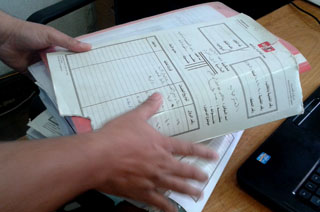
Qorsaya documents. The island was called something else by the court and the inhabitants lost the case.
-I am not afraid of the authorities, he says.
-But the other ones. Those who monitor me, cooperates with the regime and sometimes plainly beats us up. They have our phone numbers, they know that you are here and what we talk about. They are the tools of the regime and they are the ones I am afraid of, the so called "decent and loyal citizens", Mohammed Adel says ironically.
© Lennart Berggren / Axiom Film June 2015